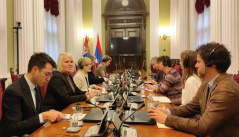The Members of the Foreign Affairs Committee met today at the National Assembly House with the Ambassador of the Federal Republic of Germany to the Republic of Serbia Anke Konrad and exchanged opinions on the European integration of Serbia and the Western Balkans region, the need for more frequent meetings, both at the bilateral and multilateral levels, ODIHR recommendations, and other current topics in Europe and the region.
At the very beginning of the meeting, the Chairperson of the Foreign Affairs Committee Marina Ragus said that Serbia has been on the path of European integration for more than 20 years and despite of that fact it will not give up on that path, but she also expressed her personal view that many disputes on the old continent would be resolved differently or would not exist if the Western Balkans region had already become part of the European community. In the discussion on this issue, she noted that Serbia is ready to open Cluster 3 and in the meantime our country is working hard on the economic integration of the region and the implementation of CEFTA.
Committee member Dobrica Veselinovic agreed that meetings of this format should become a regular activity and expressed regret, as a representative of a pro-European party, that, speaking of European integration, Cluster 3 has not been open. He said that he sees the European integration process as a transformative process for Serbian society that brings a great number of benefits to the Republic of Serbia. He also took the opportunity to mention the organisation of a roundtable in the National Assembly on the single digital market and the beginning of advocating for this topic at the regional level. He agreed that the integration process is stagnant, but the party he comes from is not afraid to discuss issues that fall within the area of the security framework.
Committee member Vladimir Djordjevic said that, despite Serbia seeing the European Union as a priority foreign policy goal, society is becoming increasingly Eurosceptic, because the process is taking too long, and there is also the impression that there are always additional measures and needs for Serbia that resemble double standards, compared to countries that have gone through the process much easier and faster. He also touched on the issue of Kosovo-Metohija, stressing that Russia is referring to this precedent in its conflict with Ukraine, and there is a concern that this will not be the only time that a country uses this unresolved issue to carry out aggression against another autonomous state. Djordjevic also expressed the view that accelerating European integration would lead to the termination of various types of conditioning, including energy diversification, which Serbia is often criticised for.
Natasa Jovanovic took the opportunity to reflect on Serbia’s the economic cooperation with Germany. She said that 80 thousand of our citizens work in German companies operating in Serbia, and that Serbia has reached a 10.5 billion euro foreign trade exchange with Germany. She added that the National Assembly has adopted a large number of laws that are aligned with the EU acquis and she spoke about dual education and cooperation between two countries’ universities.
Konrad used the opportunity to discuss the system of values that the European Union expects from its members, alluding to the right to freedom of opinion and speech as postulates of a democratic society. The Ambassador said that the discussion on opening Cluster 3 is still ongoing and asked the MPs to participate as much as possible in the Working Group dealing with the ODIHR recommendations. She pointed out that the Berlin Process is an initiative one goals of which is to reduce tensions in the region and revitalise relations between the Western Balkan countries, and that parliaments have a very important role in this mechanism. She added that Germany advocates for the formation of the Community of Serb Municipalities and that the normalisation of relations between Belgrade and Pristina would be a good signal for the entire region. Konrad also discussed Serbia's dependence on Russian energy sources, asking about the results achieved in the field of renewable energy. At the end of her presentation, she agreed that the Western Balkans should be part of the EU, but also that the EU expects solidarity and joint action from its members in all areas of interest.
Ragus used the opportunity to inform the Ambassador about the National Assembly Speaker Ana Brnabic’s dedication to the implementation of ODIHR recommendations, and that the Working Group dealing with these issues is headed by a representative of the civil sector. She said that by the end of the regular session, she expects at least one more National Assembly sitting to have, among other things, an agenda where items submitted by the opposition parties will be discussed. She also presented facts regarding the situation of Serbs in the Autonomous Province of Kosovo-Metohija, stressing that 15% of Serbs have left their homes due to the suppression of basic human rights and freedom of movement, which are the result of Albin Kurti's extremism. The Committee Chairperson also spoke about energy diversification, concluding that this long and slow process requires a multi-decade approach.
At the end of the meeting, Marina Ragus underlined that peace and stability in the region are imperative for Serbia, and the officials agreed that it is important for the entire continent that the countries of the Western Balkans become members of the European Union as soon as possible.




